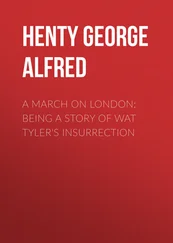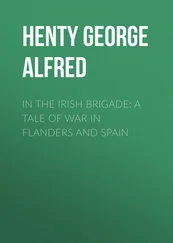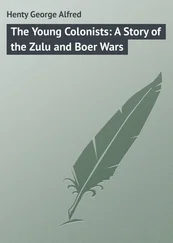George Henty - Through Three Campaigns - A Story of Chitral, Tirah and Ashanti
Здесь есть возможность читать онлайн «George Henty - Through Three Campaigns - A Story of Chitral, Tirah and Ashanti» — ознакомительный отрывок электронной книги совершенно бесплатно, а после прочтения отрывка купить полную версию. В некоторых случаях можно слушать аудио, скачать через торрент в формате fb2 и присутствует краткое содержание. Жанр: foreign_children, foreign_antique, foreign_prose, на английском языке. Описание произведения, (предисловие) а так же отзывы посетителей доступны на портале библиотеки ЛибКат.
- Название:Through Three Campaigns: A Story of Chitral, Tirah and Ashanti
- Автор:
- Жанр:
- Год:неизвестен
- ISBN:нет данных
- Рейтинг книги:4 / 5. Голосов: 1
-
Избранное:Добавить в избранное
- Отзывы:
-
Ваша оценка:
- 80
- 1
- 2
- 3
- 4
- 5
Through Three Campaigns: A Story of Chitral, Tirah and Ashanti: краткое содержание, описание и аннотация
Предлагаем к чтению аннотацию, описание, краткое содержание или предисловие (зависит от того, что написал сам автор книги «Through Three Campaigns: A Story of Chitral, Tirah and Ashanti»). Если вы не нашли необходимую информацию о книге — напишите в комментариях, мы постараемся отыскать её.
Through Three Campaigns: A Story of Chitral, Tirah and Ashanti — читать онлайн ознакомительный отрывок
Ниже представлен текст книги, разбитый по страницам. Система сохранения места последней прочитанной страницы, позволяет с удобством читать онлайн бесплатно книгу «Through Three Campaigns: A Story of Chitral, Tirah and Ashanti», без необходимости каждый раз заново искать на чём Вы остановились. Поставьте закладку, и сможете в любой момент перейти на страницу, на которой закончили чтение.
Интервал:
Закладка:
"Yes, sir."
Lisle went back to the lines and, taking his kit, went some little distance out of camp. Here he took off his uniform and put on the clothes he had worn before starting. He folded the uniform up and placed it, with his rifle and accoutrements, in a little heap.
Then he went to the tent where Robah's master lived. He had often spoken to Robah during the march and, waiting till he could catch his eye, he beckoned to him to come to him. Robah was immensely surprised at seeing him in his civilian dress, and hurried up to him.
"I have been found out, Robah, and am to join the officers on the march down. I am at present a young gentleman at large. You see that tree up there? At the foot you will find my uniform, rifle, and accoutrements. I want you to carry them to the quartermaster sergeant, and tell him to put them in store, as Mutteh Ghar has left the regiment. Of course, the story will soon be known, but I don't wish it to get about till I have seen the colonel again. I am glad to say that he is not angry with me; and has not reprimanded Gholam Singh, very severely, for aiding me in the matter."
Robah at once started on his mission, and Lisle then went into the camp, and strolled about until it was time to repair to the colonel's tent. He found the eight officers of the regiment gathered there.
"We were not mistaken, gentlemen," the colonel said. "This young scamp, instead of going down to Calcutta, left the convoy after it had marched a mile or two. Gholam Singh was in the secret, and had furnished him with the uniform and rifle of a man who had died, the day before. He put this on and marched boldly in. The other native officers of the company were in the secret, and gave out to the men that this was a new recruit, a cousin of the man we had just lost.
"Under that title he has passed through the campaign; living with the soldiers, sharing all their hardships; and being, for a time at least, altogether unsuspected of being aught but what he appeared. Gholam Singh said that his conduct was excellent; that he was a great favourite, with the men, for the good humour with which he bore the hardships. He was with Beynon and Moberley, and showed great pluck and steadiness in picking off several of the enemy, as they fled.
"Fortunately, Moberley overheard him mutter to himself in English, and so the matter came out. Moberley promised to keep silence till we got here and, this morning, he told the whole story. Of course, we could not have poor Bullen's son remaining a private in the Pioneers, and he has joined us under the old conditions. I have given him the rank of lieutenant, and shall recommend him for a commission; which I have no doubt he will get, not only as the son of an officer who had done excellent service, but for the pluck and enterprise he has shown. His perfect knowledge of Punjabi will also, of course, count in his favour."
The officers all shook hands cordially with him, and congratulated him on the manner in which he had carried out his disguise; and he was at once made a member of the mess. Afterwards, two or three of them walked with him down to the lines of his company. The men regarded them with interest, and then burst into a loud cheer.
"That is good," the officer said. "It shows that you like him. Henceforth he will rank as one of the officers; and I hope you will all like him, in that capacity, as well as you did when he was one of yourselves."
They then walked off, leaving the company in a state of excitement.
In the afternoon, at mess, Lisle learned the whole details of the siege, which had been gathered from the officers of the garrison. On March 2nd, Mr. Robertson received information that Sher Afzul had arrived in the valley and, the next day, news came that he was, with a large following, at a small house in a ravine, about a mile and a quarter from the fort. Captain Campbell, with two hundred of the Kashmir Rifles, was sent out to make a reconnaissance. He was accompanied by Captains Townshend and Baird, and by Surgeon Captain Whitchurch and Lieutenant Gurdon. The rest were left in the bazaar, to hold the road.
The enemy, one hundred and fifty strong, were seen on the bare spur which forms the right bank of the ravine. To test whether or not they were hostile, a single shot was fired over them. They at once opened a heavy fire on the party and, at the same time, Captain Townshend became engaged with some of the enemy who were in hiding among rocks–evidently in considerable strength. It was subsequently discovered that, very shortly after Captain Campbell's party left the fort, and before hostilities began, the enemy had opened fire on the fort, and had crossed the river.
Captain Baird now advanced across the mouth of the ravine, and charged up the spur; the enemy retreating before them, firing as they went. Captain Baird fell, mortally wounded; and Lieutenant Gurdon, who had carried a message to him, was left in command. The enemy descended into the ravine and, crossing to the left bank, took Gurdon in rear.
In the meantime, affairs had not been going well with Captain Townshend's party. He had advanced within two hundred yards of the hamlet, keeping his men as well as he could under shelter, and firing in volleys. The enemy, however, kept on advancing, and overlapping his force on both flanks. They were well armed and skilful marksmen, and took shelter in such a marvellous way that there was nothing for our men to fire at, except a few puffs of smoke.
Captain Campbell then ordered a charge with the bayonet, to clear the hamlet. It was gallantly led, by Captain Townshend and two native officers. The ground being perfectly open, and the fire of the enemy being steady and continuous, the two native officers and four sepoys were killed at once.
When they got within forty yards of the village, which was concealed in a grove of trees, they found that it was a large place; with a wall, three hundred feet in length, behind which the enemy were posted in perfect cover. There was nothing for it but to retreat. Captain Campbell was, at this moment, shot in the knee; and Captain Townshend assumed the command. Captain Campbell was carried to the rear, and the force retired in alternate parties.
The retreat, however, was conducted slowly and deliberately; though the enemy, who came running out, soon overlapped the little column–some even getting behind it, while groups of fanatic swordsmen, from time to time, charged furiously down upon it. From all the hamlets they passed through, a fire was opened upon them by the Chitralis, those who were supposed to be friendly having gone over to the other side. So heavy was the fire that, at last, Townshend ordered his men to double. This they did with great steadiness; and he was able to rally them, without difficulty, at a small hamlet, where he found Mr. Robertson encouraging the men he had brought out. A message was sent to the fort for reinforcements, and Lieutenant Harley led out fifty of the Sikhs, and covered the retreat to the fort.
In the meantime Gurdon, with his detachment and Captain Baird, were still far away on the steep side of the ravine. Dr. Whitchurch, who had dressed Baird's wound, was sent to take him to the rear; and it was then that Townshend's party began to retreat and, after fierce fighting, arrived at the fort, where they found that Whitchurch had not arrived.
The doctor had with him a handful of sepoys and Kashmir Rifles, and some stretcher bearers, under the command of a native officer. Matters had developed so rapidly that, in a very short time, they were behind Townshend's retreating parties, round which the enemy were swarming; and when the retirement became a rapid retreat, they dropped farther behind. Small detached parties soon became aware of their position, and attacked them. Three men, who were carrying the stretcher, were killed by successive shots and, when the fourth was hit, the stretcher could be no longer carried; so Captain Baird was partly carried, and partly dragged along the ground.
Читать дальшеИнтервал:
Закладка:
Похожие книги на «Through Three Campaigns: A Story of Chitral, Tirah and Ashanti»
Представляем Вашему вниманию похожие книги на «Through Three Campaigns: A Story of Chitral, Tirah and Ashanti» списком для выбора. Мы отобрали схожую по названию и смыслу литературу в надежде предоставить читателям больше вариантов отыскать новые, интересные, ещё непрочитанные произведения.
Обсуждение, отзывы о книге «Through Three Campaigns: A Story of Chitral, Tirah and Ashanti» и просто собственные мнения читателей. Оставьте ваши комментарии, напишите, что Вы думаете о произведении, его смысле или главных героях. Укажите что конкретно понравилось, а что нет, и почему Вы так считаете.












